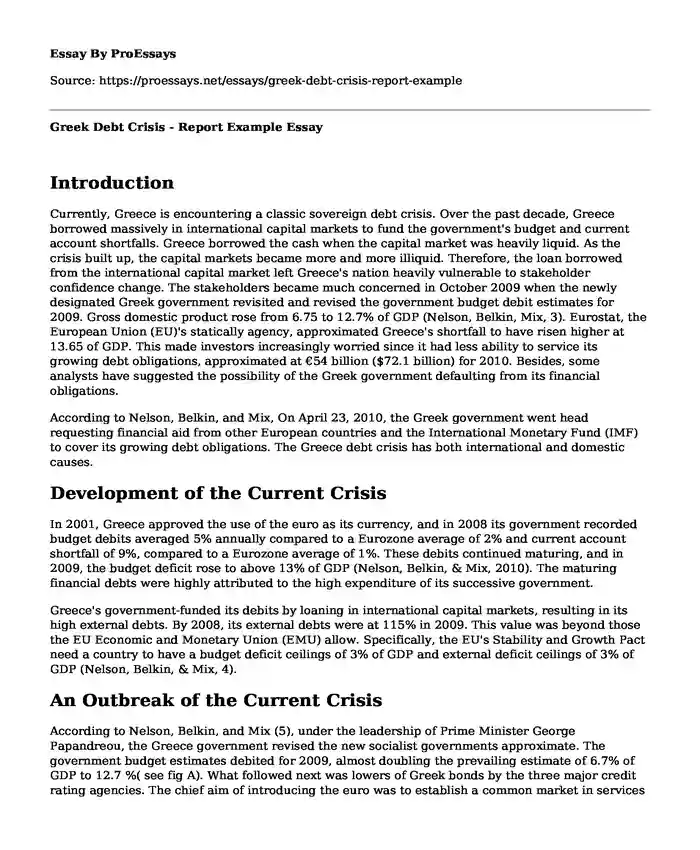Introduction
Currently, Greece is encountering a classic sovereign debt crisis. Over the past decade, Greece borrowed massively in international capital markets to fund the government's budget and current account shortfalls. Greece borrowed the cash when the capital market was heavily liquid. As the crisis built up, the capital markets became more and more illiquid. Therefore, the loan borrowed from the international capital market left Greece's nation heavily vulnerable to stakeholder confidence change. The stakeholders became much concerned in October 2009 when the newly designated Greek government revisited and revised the government budget debit estimates for 2009. Gross domestic product rose from 6.75 to 12.7% of GDP (Nelson, Belkin, Mix, 3). Eurostat, the European Union (EU)'s statically agency, approximated Greece's shortfall to have risen higher at 13.65 of GDP. This made investors increasingly worried since it had less ability to service its growing debt obligations, approximated at €54 billion ($72.1 billion) for 2010. Besides, some analysts have suggested the possibility of the Greek government defaulting from its financial obligations.
According to Nelson, Belkin, and Mix, On April 23, 2010, the Greek government went head requesting financial aid from other European countries and the International Monetary Fund (IMF) to cover its growing debt obligations. The Greece debt crisis has both international and domestic causes.
Development of the Current Crisis
In 2001, Greece approved the use of the euro as its currency, and in 2008 its government recorded budget debits averaged 5% annually compared to a Eurozone average of 2% and current account shortfall of 9%, compared to a Eurozone average of 1%. These debits continued maturing, and in 2009, the budget deficit rose to above 13% of GDP (Nelson, Belkin, & Mix, 2010). The maturing financial debts were highly attributed to the high expenditure of its successive government.
Greece's government-funded its debits by loaning in international capital markets, resulting in its high external debts. By 2008, its external debts were at 115% in 2009. This value was beyond those the EU Economic and Monetary Union (EMU) allow. Specifically, the EU's Stability and Growth Pact need a country to have a budget deficit ceilings of 3% of GDP and external deficit ceilings of 3% of GDP (Nelson, Belkin, & Mix, 4).
An Outbreak of the Current Crisis
According to Nelson, Belkin, and Mix (5), under the leadership of Prime Minister George Papandreou, the Greece government revised the new socialist governments approximate. The government budget estimates debited for 2009, almost doubling the prevailing estimate of 6.7% of GDP to 12.7 %( see fig A). What followed next was lowers of Greek bonds by the three major credit rating agencies. The chief aim of introducing the euro was to establish a common market in services and goods by eliminating the transaction through sharing a common currency. Moreover, countries that adopted the euro as their currency and experienced high-interest rates were projected to be loaned at lesser rates in the prospect. Earlier economic developments motivated assurance of the attainment of the euro. Greece noticed their borrowing costs were reduced among many countries, which made interest rates turn to negative values. Figure A below illustrates the real rates of interest in certain Eurozone countries. In 1998, before euro interest rates were up from 2001 to 2007, rate interest dropped to negative, excluding Germany’s case, which maintained a positive interest rate for the entire period.
Reduced interest rates motivated the private and public sector to borrow that to higher rates. Ireland's GPD developed by 87%, Greece's by 44%, Spain's by 39% and Greece' raised by 15% from 1999-2007. These nominal GDP growths spur economic activities caused by price to escalate upper, particularly in countries with lesser interest rates (Wickens, 222). Therefore, whereas the price level in Germany's price standards upsurge by 9%, Greece's by 38%, Portugal's by 35% and Ireland's by 41% between 1999-2008. These appreciations in price level led to a massive lowness (Wickens, 223).
Conclusion
The above paragraph provides strong evidence for the claim that from the adoption of the common currency, Eurozone countries are away from converging as projected, had deviating outcome until when the financial crisis occurred in 2007-2008. From then, there has been no substantial output progress and nearly to zero inflation. Essentially, because of having a common euro currency, countries such as Greece and Germany encountered negative interest rates; the crisis emerged, characterized by the maximum economic development rates and lack of effectiveness. Excessive borrowing of governments in countries such as Greece was stimulated by their ability to borrow at negative and reduced interest rates.
Works Cited
Nelson, Rebecca M., Paul Belkin, and Derek E. Mix. "Greece's debt crisis: Overview, policy responses, and implications." Library of Congress Washington DC Congressional Research Service, 2010. https://www.everycrsreport.com/files/20100427_R41167_058a0ccb8005af5f2bbf46ddc3a16facf7fb122b.pdf
Wickens, Michael. "The Eurozone financial crisis: debt, credit ratings and monetary and fiscal policy." Empirical 43.2 (2016): 219-233.
https://link.springer.com/article/10.1007/s10663-016-9335-5.
Cite this page
Greek Debt Crisis - Report Example. (2024, Jan 08). Retrieved from https://proessays.net/essays/greek-debt-crisis-report-example
If you are the original author of this essay and no longer wish to have it published on the ProEssays website, please click below to request its removal:
- Essay Sample on Accounting Ethics and Fraud
- A Discussion on Trade Agreements and Trans-Border Flows of Labor in Saudi Arabia
- Health Insurance Plans and Their Impact on the United States Essay Example
- Analytical Essay Sample on H&M
- Similarities Between Skills Approach and Trait Theory - Research Paper
- Labor Relations Process Case Study
- Essay Example on The Social Responsibility of Companies in the 21st Century







